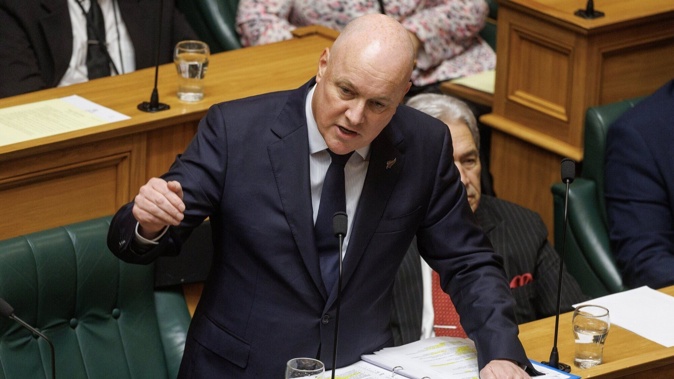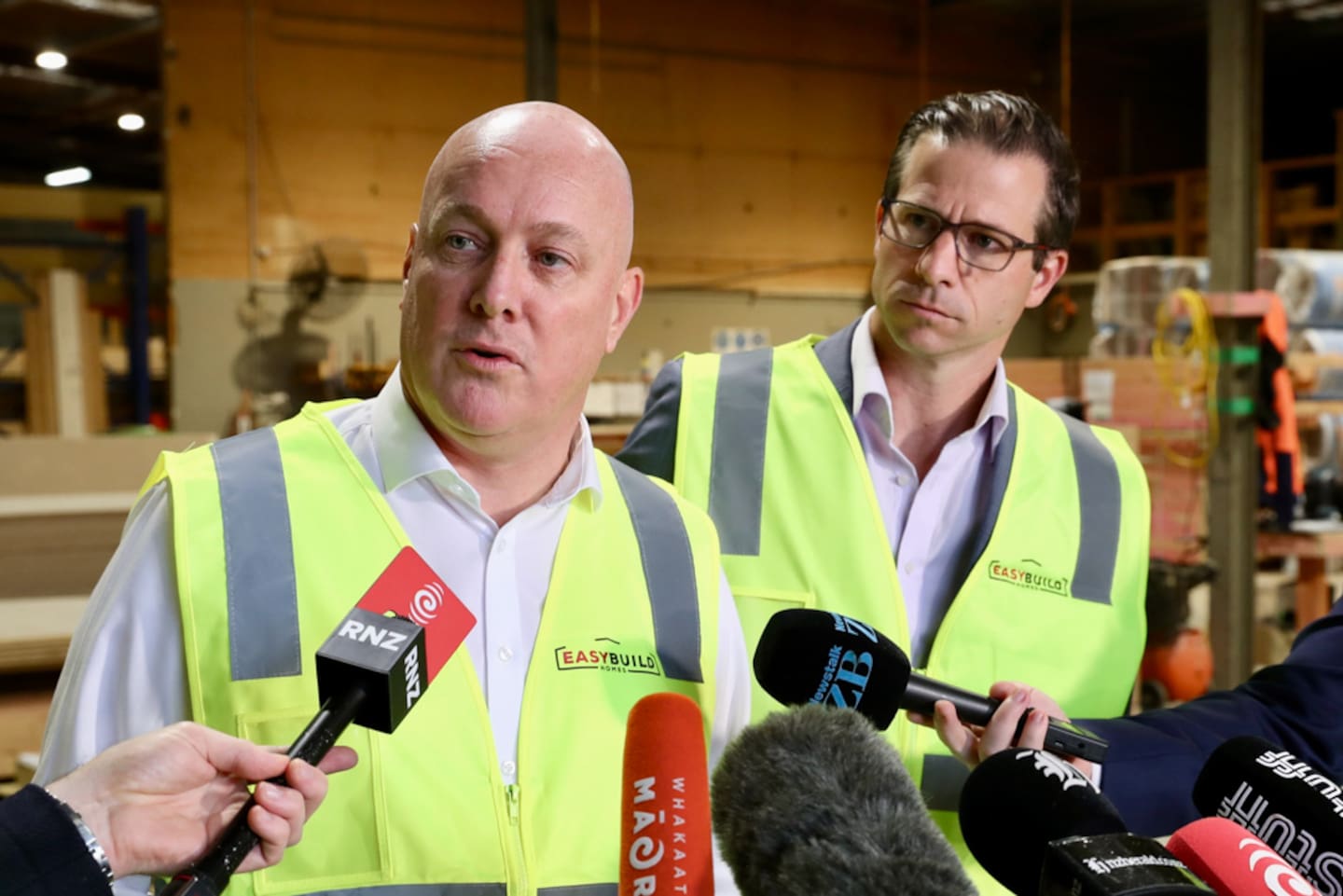
The Government is expected to shortly take decisions on transitioning the country’s fleet to Road User Charges, pass legislation allowing businesses to deduct pay in response to partial strikes, and open the 600-bed extension at Waikeria Prison.
These are among 38 actions the Government has announced it will take over the next quarter.
It’s part of a plan Prime Minister Christopher Luxon says will boost the economy and help New Zealanders.
“There are positive signs of the economic turnaround this Government was elected to deliver, and our latest quarterly plan lays out more of the actions we will take to rebuild the economy, reduce the cost of living, and make Kiwis better off,” he said.
Luxon added that “growth doesn’t just miraculously happen” and he made “no excuse for keeping the public service focused on delivery with these quarterly action plans”.
There are few surprises on the quarter two plan. Many of the actions are to simply “take Cabinet decisions” or “pass legislation” that is already close to finishing in the House. One action is to deliver a Budget, something that happens annually.
The full list of 38 actions can be found below, but they include introducing legislation to ratify the recently signed New Zealand-United Arab Emirates Comprehensive Economic Partnership Agreement.
Trade Minister Todd McClay announced on Sunday that he would travel to Abu Dhabi this week to attend an investment conference and strength ties with UAE, which has two-way trade with New Zealand currently valued at $1.3 billion.
“Foreign direct investment is vital for New Zealand’s economic growth and UAE investors are seeking high-growth opportunities. New Zealand offers world-class prospects in energy, infrastructure, cleantech, fintech, transport, manufacturing, aquaculture, and many more sectors,” McClay said.
“Building on the recent Infrastructure Investment Summit, we’re now presenting these opportunities directly to top-tier investors offshore.”
The action plan includes introducing legislation to establish Invest NZ, the new agency that will help attract foreign direct investment. Legislation will also be introduced to amend the Overseas Investment Act, reforms which David Seymour has been pursuing to simplify getting investment into Kiwi business.
A new tourism growth roadmap is expected to be launched as well as a plan to boost export education earnings. Cabinet decisions are also expected on the Parent Visa Boost, which would make it easier for migrants to have their parents or grandparents enter the country.
One promise the Government has fulfilled is to pass legislation removing barriers to the use of overseas building products. That passed its third reading last week.
 Prime Minister Christopher Luxon and Building and Construction Minister Chris Penk want to break down barriers to overseas products coming here. Photo / Mark Mitchell.
Prime Minister Christopher Luxon and Building and Construction Minister Chris Penk want to break down barriers to overseas products coming here. Photo / Mark Mitchell.
Cabinet is expected to consider decisions on the fleetwide transition to Road User Charges (RUCs). The Government has previously spoken about transitioning the light vehicle fleet to RUCs by as early as 2027 to ensure the system for funding transport investment remainsviable. With vehicles becoming more fuel-efficient, the Government has said excise tax on petrol is no longer sustainable.
The plan also includes passing legislation that would allow for pay deductions in response to partial strikes. This involves workers turning up to their workplace but not completing key tasks.
Speaking in Parliament last year, Seymour said this would “provide a far more effective and efficient bargaining environment where rights and consequences are more balanced and which minimises potential disruption to public services”. Labour’s Camilla Belich said all it did was “attack workers’ rights” and “take working New Zealanders backwards”.
There’s a number of law and order actions, like opening a 600-bed extension at Waikeria Prison and taking decisions on proposals from an advisory group about strengthening trespass law.
The Government also plans a pilot attendance programme to set expectations for students and outline the action schools should take for any student who reaches a threshold of days absent. That could include the prosecution of parents.
But just because the Government is committing to doing something this quarter, doesn’t mean it will be able to follow through.
A checklist of the 40 actions it promised to undertake between January and March this year shows it missed completing three.
The quarter one plan said Cabinet would take decisions on the Regulatory Standards Bill, which would outline principles for responsible regulation. A paper was completed but Cabinet has not yet considered it. The quarter two plan promises the legislation will be introduced shortly.
Cabinet did consider a Health Infrastructure Investment Plan, but it’s not yet been published as the quarter one action plan said.
A promise to take Cabinet decisions on legislation to improve the regulation of medical devices has been pushed out to allow for more industry consultation.
The full action plan for quarter two:
- Deliver a Budget focused on boosting economic growth, improving social outcomes, controlling government spending, and investing in long-term infrastructure.
- Introduce legislation to ratify the New Zealand–United Arab Emirates Comprehensive Economic Partnership Agreement.
- Introduce legislation to establish Invest NZ to position New Zealand as a premier destination for the foreign direct investment that will create higher paying jobs and grow the economy.
- Introduce legislation amending the Overseas Investment Act to make it easier, quicker, and more transparent for foreign investors to invest in and grow New Zealand businesses.
- Take Cabinet decisions on the Parent Visa Boost, to enable migrants to sponsor their parents or grandparents to enter the country.
- Launch the Tourism Growth Roadmap, the second phase of the Government’s plan to boost tourist numbers and drive economic growth
- Deliver a plan to boost export education earnings.
- Introduce the Regulatory Standards Bill to improve the quality of regulation by ensuring regulatory decisions are based on principles of good law-making and economic efficiency.
- Begin public consultation on changes to the Driver Licencing system.
- Take Cabinet decisions on the fleetwide transition to Road User Charges.
- Begin public consultation on National Direction to the Resource Management Act to unlock development in infrastructure, housing, and our primary industries.
- Begin public consultation on the 30-year National Infrastructure Plan.
- Pass legislation to remove barriers to the use of overseas building products to increase competition and reduce costs.
- Take Cabinet decisions on self-certification for low-risk work and reducing inspection wait times to reduce building costs.
- Introduce legislation to make targeted improvements to the Public Works Act to make it faster and fairer to acquire land for building infrastructure.
- Agree the first Regional Deal Memorandum of Understanding (MoU) to drive economic growth and improve the supply of housing and infrastructure.
- Take Cabinet decisions on reforms to the Commerce Act to improve competition settings.
- Take Cabinet decisions on capital markets settings to remove barriers to listing, reduce costs to firms and enable greater investment in private assets from KiwiSaver providers.
- Pass legislation to allow businesses to make pay deductions in response to partial strikes.
- Take Cabinet decisions to refocus WorkSafe and the WorkSafe New Zealand Act to reduce unnecessary compliance costs for business while enhancing worker safety.
- Introduce legislation to establish a regulatory system for online gambling to reduce gambling harm.
- Pass legislation to extend TAB’s monopoly to online racing and sports betting, keeping revenue in New Zealand to support local industries and strengthening gambling harm protections.
- Publish the first Government AI strategy to help drive adoption of AI to boost productivity and grow the economy.
- Introduce legislation to limit farm-to-forestry conversions from entering the Emissions Trading Scheme to protect productive land.
- Introduce legislation to enable the designation of herds of special interest to raise our international profile as a hunting destination and help support an increase in hunting tourism.
- Open the 600-bed extension at Waikeria Prison to support the Government’s efforts to keep criminals off the streets.
- Pass legislation that empowers victims of sexual violence to determine whether their attackers receive name suppression.
- Take Cabinet decisions on proposals from the Ministerial Advisory Group for Victims of Retail Crime to strengthen trespass law.
- Take Cabinet decisions to further strengthen consequences for crime by reforming the Crimes Act.
- Take Cabinet decisions on AML/CFT reform to improve the supervisory and funding model; and to reduce the burden on business while enhancing access to financial services for everyday Kiwis.
- Deliver 10,500 additional elective procedures through the Health NZ electives boost.
- Complete the Year 7-8 maths tutoring trial and begin evaluation.
- Complete sector consultation on the Year 11-13 maths, English, Pāngarau and Te Reo Rangatira curricula.
- Introduce legislation to strengthen the performance of the education system.
- Pilot the Stepped Attendance Response with select schools to raise student attendance.
- Pass legislation to expand the Traffic Light System to add more tools to support people off welfare into work.
- Introduce legislation to require freedom of expression in universities.
- Take Cabinet decisions on scaling up the New Zealand biodiversity credit market to incentivise the protection and restoration of native wildlife.
Take your Radio, Podcasts and Music with you









